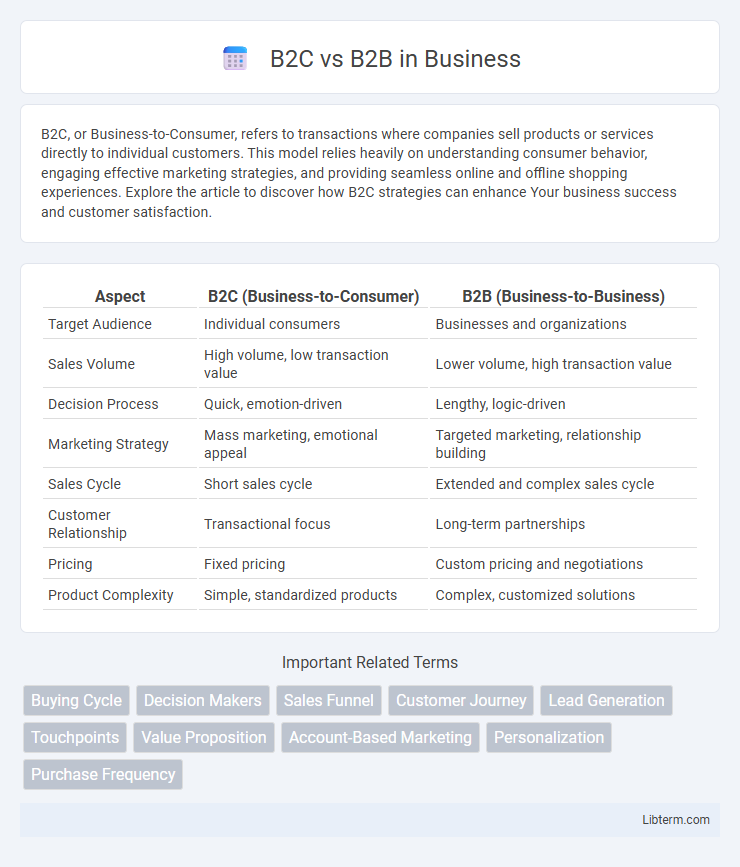B2C, or Business-to-Consumer, refers to transactions where companies sell products or services directly to individual customers. This model relies heavily on understanding consumer behavior, engaging effective marketing strategies, and providing seamless online and offline shopping experiences. Explore the article to discover how B2C strategies can enhance Your business success and customer satisfaction.
Table of Comparison
| Aspect | B2C (Business-to-Consumer) | B2B (Business-to-Business) |
|---|---|---|
| Target Audience | Individual consumers | Businesses and organizations |
| Sales Volume | High volume, low transaction value | Lower volume, high transaction value |
| Decision Process | Quick, emotion-driven | Lengthy, logic-driven |
| Marketing Strategy | Mass marketing, emotional appeal | Targeted marketing, relationship building |
| Sales Cycle | Short sales cycle | Extended and complex sales cycle |
| Customer Relationship | Transactional focus | Long-term partnerships |
| Pricing | Fixed pricing | Custom pricing and negotiations |
| Product Complexity | Simple, standardized products | Complex, customized solutions |
Overview of B2C and B2B Models
B2C (Business-to-Consumer) models involve direct transactions between businesses and individual consumers, emphasizing quick decision-making and emotional appeal. B2B (Business-to-Business) models focus on longer sales cycles, targeting organizational buyers with detailed product specifications and relationship-building. Both models require tailored marketing strategies to address distinct buyer behaviors and purchasing processes.
Key Differences Between B2C and B2B
B2C (Business-to-Consumer) primarily targets individual customers with shorter sales cycles and emotional purchasing decisions, whereas B2B (Business-to-Business) focuses on organizational clients involving longer sales processes and rational decision-making. B2B transactions typically handle larger order volumes, customized solutions, and require relationship-building efforts, while B2C emphasizes mass marketing, brand loyalty, and quick conversions. Understanding these differences is essential for crafting effective marketing strategies, sales approaches, and customer engagement tactics tailored to each model.
Target Audience Analysis
B2C target audience analysis centers on individual consumers driven by emotions, personal preferences, and quick decision-making, often relying on demographic and psychographic data to tailor marketing strategies. In contrast, B2B target audience analysis focuses on organizational buyers, emphasizing factors such as company size, industry, decision-making units, and budget cycles, requiring detailed insights into business needs and procurement processes. Effective segmentation and understanding of pain points are crucial for both, but B2B demands longer relationship-building and multiple stakeholder engagement.
Sales Cycle Comparison
The B2C sales cycle typically involves shorter decision-making processes driven by emotional and impulse purchases, often concluding within days or even hours. In contrast, B2B sales cycles are longer, ranging from weeks to several months, due to the complexity of negotiations, multiple stakeholders, and the need for detailed product evaluations. Understanding these differences is crucial for tailoring marketing strategies and optimizing sales approaches in each sector.
Marketing Strategies for B2C vs B2B
B2C marketing strategies emphasize emotional appeals, brand storytelling, and quick decision-making processes to attract individual consumers through social media, influencer partnerships, and targeted advertising. B2B marketing prioritizes relationship-building, detailed product information, and longer sales cycles by leveraging content marketing, personalized email campaigns, and industry-specific events or webinars. Utilizing analytics and CRM tools, B2B marketers optimize lead nurturing, while B2C marketers focus on customer engagement and retention through loyalty programs and personalized offers.
Customer Relationship Management
B2C Customer Relationship Management (CRM) emphasizes personalized marketing strategies and rapid response to consumer behaviors, leveraging tools like social media integration and AI-driven insights to enhance customer engagement. In contrast, B2B CRM prioritizes long-term relationship building, detailed account management, and complex sales cycles, utilizing CRM systems that support multi-level contact management and tailored communication workflows. Effective CRM in B2C maximizes customer retention through personalized experiences, while B2B CRM focuses on nurturing client partnerships and streamlining lead management for business growth.
Pricing and Negotiation Approaches
B2C pricing is typically fixed, transparent, and designed for quick purchase decisions, relying heavily on psychological pricing strategies and discounts to attract individual consumers. B2B pricing is often customized, negotiable, and based on volume, long-term contracts, and value-based agreements tailored to the specific needs of each client. Negotiation in B2B involves detailed discussions, contract terms, and relationship-building, whereas B2C negotiations are rare and usually limited to promotions or limited-time offers.
Technology and Tools in B2C vs B2B
Technology and tools in B2C markets prioritize high-volume, scalable solutions such as CRM platforms like Salesforce, social media marketing tools, and AI-driven personalization engines to enhance customer experience and engagement. B2B technology focuses on integrations, complex ERP systems, and account-based marketing (ABM) platforms like HubSpot and Marketo, designed to manage lengthy sales cycles and multiple stakeholder relationships. Both sectors leverage data analytics but B2B emphasizes predictive analytics for lead scoring and workflow automation to optimize long-term client management.
Challenges and Opportunities
B2C companies face challenges in rapidly changing consumer preferences and high competition, requiring agile marketing strategies and personalized customer experiences to maintain loyalty. B2B enterprises encounter complex decision-making processes and longer sales cycles, demanding relationship-building and tailored solutions to meet specific business needs. Both sectors can capitalize on digital transformation and data analytics to optimize customer targeting and operational efficiency.
Choosing the Right Model for Your Business
Choosing the right business model between B2C (Business-to-Consumer) and B2B (Business-to-Business) depends on your target audience, sales cycle, and product complexity. B2C models typically involve shorter sales cycles and focus on emotional branding and mass-market appeal. B2B models prioritize relationship-building, longer decision processes, and customized solutions tailored to client needs.
B2C Infographic

 libterm.com
libterm.com